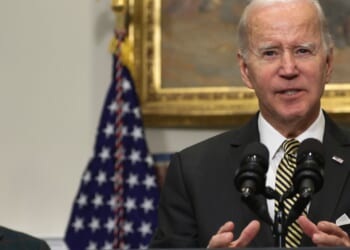Harvard University Professor Graham Allison, he of “Thucydides Trap” fame, writes in the National Interest that President Trump may be able to end the Ukraine War on acceptable, if imperfect, terms if he emulates President Dwight Eisenhower’s strategy that ended the Korean War.
It is an intriguing comparison — one that will surely upset Allison’s Harvard colleagues, who will scoff at the notion that Donald Trump and Dwight Eisenhower should be mentioned in the same sentence. It is not that his liberal colleagues admire Eisenhower, the president — they don’t. But Trump Derangement Syndrome doesn’t allow those that it afflicts to imagine Trump channeling the Allied Supreme Commander in World War II. (RELATED: Eisenhower: A Conservative in Action, Not Ideology)
Yet, Allison is right — Eisenhower’s success in ending the Korean War on terms unsatisfactory to all sides is a good model for Trump to use to end the Ukraine War. (RELATED: When Ike Said No)
In the 1952 presidential campaign, Republican candidate Eisenhower pledged to “go to Korea” to bring an end to the costly and politically divisive war. In 2024, Republican candidate Trump promised to end the Ukraine war soon after he takes office. (RELATED: Trump: The New Eisenhower on NATO)
Even before taking office in 1953, Eisenhower offended our ally South Korean leader Syngman Rhee — who wanted to fight on to victory — by opposing Rhee’s plans for another offensive and threatened to end joint operations with South Korean forces — as Allison puts it, Ike threatened to leave Rhee “on his own, unless he fell in line.” Ike’s administration then worked toward a ceasefire with our opponents in China, North Korea, and the Soviet Union. (RELATED: The Korean Armistice: The Triumph of Containment Over Liberation)
Trump, shortly after beginning his second term as president in 2025, offended Ukrainian President Zelenskyy, who, like Rhee, wants to fight on to victory, by telling him Ukraine must seek peace with Vladimir Putin’s Russia to bring an end to the costly and indecisive war. Trump, like Eisenhower, threatened to end support for Ukraine’s war effort. Trump was criticized by Ukraine’s supporters in the U.S. and Europe for trying to strike a deal with Vladimir Putin.
Eisenhower was dealing with North Korea’s Kim Il Sung, China’s Mao Zedong, and Soviet leader Josef Stalin — totalitarian despots whose murderous deeds and crimes against humanity far exceeded anything Putin, as bad as he is, has done thus far. If Ike’s administration could negotiate with those regimes, Trump’s administration can surely negotiate with Putin.
Eisenhower understood that a negotiated peace would have to reflect the facts on the ground. Even though the United States and the United Nations had pledged to unify the Korean peninsula under Syngman Rhee’s rule after Gen. Douglas MacArthur’s stunning Inchon landing in September 1950, which liberated Seoul and sent North Korean forces retreating across the 38th Parallel, the massive intervention of Chinese troops in October-November 1950 turned the tide of war against U.S., U.N., and South Korean forces. By the time Ike entered office as president, the Korean War was a bloody stalemate.
President Trump, like Eisenhower in Korea, recognizes that the Ukraine War is a bloody stalemate, and that Ukraine has no hope of victory. As Allison notes, Russian forces have been seizing eastern Ukrainian territory slowly but consistently, especially in the Donbas region. Trump, like Eisenhower in Korea, wants to “forge a sustainable peace.” He, like Eisenhower, wants the dying and destruction to stop. (RELATED: Liberals Supported Deals With Communists but Not With Putin)
No one was happy about the armistice that ended the Korean War, except the troops on both sides who got to go home, and the prisoners of war on both sides who were released and repatriated. The Korean peninsula remained divided, as it still is today.
North Korea continues to be ruled by the tyrannical Kim dynasty, while South Korea has enjoyed, for some time, a functioning if imperfect democracy and relative economic prosperity. If Trump’s deal with Russia can achieve something similar, Allison writes, “he will be able to claim that he has achieved the peace ‘deal of the century.’” That would drive Allison’s Harvard colleagues crazy.
READ MORE from Francis P. Sempa:
Are We at the End of American Maritime Hegemony?
No, Professor Willerton: Reagan Changed the World and Gorbachev Let Him





![Trump's Admin Guts Another ‘Rogue Government Agency with Zero Accountability’ [WATCH]](https://www.right2024.com/wp-content/uploads/2025/03/Trumps-Admin-Guts-Another-‘Rogue-Government-Agency-with-Zero-Accountability-350x250.jpg)



![‘We All Owe Him (Elon) a Huge Debt of Gratitude’ [WATCH]](https://www.right2024.com/wp-content/uploads/2025/03/‘We-All-Owe-Him-Elon-a-Huge-Debt-of-Gratitude-350x250.jpg)
![NCAA Champ Salutes President Trump After ‘BIGGEST UPSET IN COLLEGE WRESTLING HISTORY’ [WATCH]](https://www.right2024.com/wp-content/uploads/2025/03/NCAA-Champ-Salutes-President-Trump-After-‘BIGGEST-UPSET-IN-COLLEGE-350x250.jpg)






